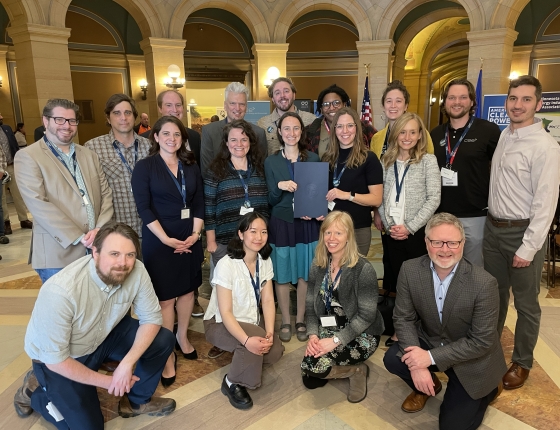After passing expansive, visionary energy and climate policies in 2023, this year Minnesota lawmakers tackled challenging and detailed policies to facilitate efficient and successful implementation of those ambitious goals. States across the U.S. have been grappling with the difficult work of enabling efficient and timely implementation of clean energy projects, while heeding the needs of their residents and workers and managing environmental impacts. We are proud of the balanced and thoughtful way Minnesota lawmakers approached these complex and critical issues. It was not easy to identify solutions that move Minnesota forward in our clean energy transition without compromising on our state’s longstanding regulatory oversight and community input, but ultimately lawmakers worked together to pass key legislation that paves the way for faster and more effective implementation of vital energy policies, including the 100% Clean Energy Bill, ECO, and the state goal to achieve net zero greenhouse gas emissions by 2050.
Here are some of the important policies the Minnesota legislature passed this year in the Agriculture and Energy Omnibus.
Policies passed that CEE played a direct role in organizing and promoting:
- Key modifications to ECO – The changes to ECO support a more practical regulatory approach to efficient fuel switching, reduce administrative burden, expand customer options, and maximize savings benefits for more Minnesotans. CEE had the honor of working hard on these modifications with bill authors Senator Rarick and Representative Stephenson, whose persistence and bipartisan collaboration mobilized stakeholders. Read our blog post about the updates.
- Benchmarking revisions – The changes clarified definitions, the properties covered by the law, and the utilities impacted to support implementation for Commerce, building owners, and utilities.
Kudos to our clean energy partners for spearheading the passage of:
- Residential energy codes – The codes were updated to increase efficiency requirements and accelerate the adoption of codes. This provides the Department of Labor and Industry with a clear path to codes adoption. These efforts were led by Fresh Energy and supported by CEE and other clean energy partners.
- Sabathani Community Center funding – Sabathani, a longtime community partner and client of CEE, received funding for a geothermal district system to replace their old, inefficient, and expensive boilers (nicknamed Thelma and Louise). This project will help Sabathani meet their substantial energy efficiency and decarbonization goals, and dramatically lower their utility bills, allowing them to be both environmentally and financially sustainable. Read more about Sabathani’s history and their work with CEE in this blog post.
- Geothermal pilots and study – The Ag and Energy conference committee report increased future investments in geothermal district systems in NGIA, along with a study to explore the potential for geothermal in our future energy landscape. This bill was led by Representative Patty Acomb, Chair of the House Climate and Energy Policy Committee, who CEE has been honored to work with on numerous legislative efforts.
- Permitting reform – After the passage of 100% by 2040 in the 2023 session, utilities, clean energy organizations, and community organizations recognized that Minnesota needed to streamline the permitting process for clean energy investments in order to reach its goals. So, since last summer, stakeholders have been discussing and working on innovative and transformative reforms to the way our renewable energy systems and transmission are permitted. The reforms are expected to reduce the total permitting time by as much as 9–18 months for transmission and large power generation facilities without losing valuable public input and scrutiny. It consolidates the disparate ways to permit and streamlines all the clean energy and transmission permitting into a single framework.
The passage of ECO and other major clean energy policies in the past few years have set the stage for forward-thinking leaps in Minnesota's energy use and sustainability practices. The theme of this 2024 legislative session was how to make those innovative goals a reality with practical solutions born from the direct input of stakeholders. These measured but essential steps reflect what has made Minnesota a national leader in clean energy.
